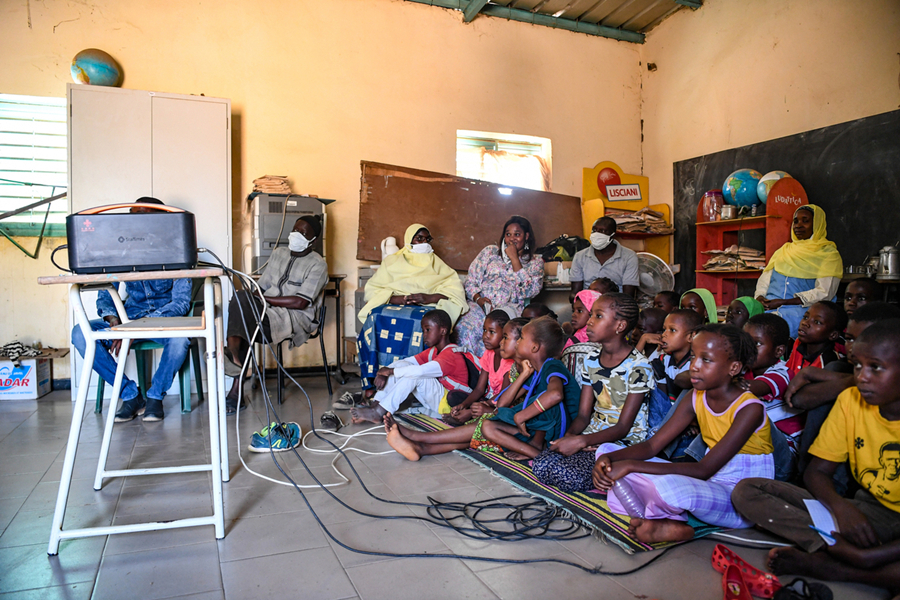
Students watch satellite television on Monday via a projector provided by the Chinese media company StarTimes as part of a China-funded project at a school on the outskirts of Dakar, Senegal. The satellite TV project is one of the fruits of the resolutions of the 2015 summit of the Forum on China-Africa Cooperation held in Johannesburg, South Africa, in which the Chinese government pledged to provide satellite TV in 10,000 African villages. [Photo/Xinhua]
By Zeng Aiping
The Eighth Ministerial Conference of the Forum on China-Africa Cooperation will be held in Dakar, Senegal, on Monday and Tuesday.
The conference, whose theme is "Deepen China-Africa partnership and Promote Sustainable Development to Build a China-Africa Community with a Shared Future in the New Era", is expected to adopt four documents-the Dakar Action Plan (2022-24), the 2035 Vision for China-Africa Cooperation, the Sino-African Declaration on Climate Change, and the Declaration of the Eighth Ministerial Conference of the FOCAC.
It is also likely to open a new chapter in building a shared community amid the COVID-19 pandemic and fast-changing international situations.
In the 21 years since the establishment of the FOCAC, China and Africa together have made remarkable achievements and strengthened cooperation. And China and African countries should continue to regularly communicate with one another and deepen their strategic friendship to deal with common global challenges.
The past FOCAC conferences introduced feasible measures to boost cooperation on agriculture, industry, education, human resources, healthcare, trade, infrastructure, people-to-people exchanges and security. Apart from benefiting both sides, the measures have also helped African countries solve some major problems including shortage of funds, labor and infrastructure.
Thanks to the FOCAC, China has become one of Africa's most important global partners and boosted African countries' development. China has not only been Africa's largest trading partner for 12 consecutive years, it is also one of the biggest investors in Africa and biggest financier for infrastructure construction.
The FOCAC has also raised African countries' global standing, prompting the rest of the world to pay more attention to the continent, thereby increasing investments in Africa.
Besides, due to their special relationship with China, African countries support China on its core issues including national rejuvenation, making China-Africa partnership a model for win-win cooperation.
A brighter future lies ahead of the FOCAC because China and Africa have vowed to strengthen cooperation in various fields including the production and distribution of vaccines, which will help contain the pandemic on the continent and thus facilitate the recovery of the African economy.
It is also important that China and Africa learn from each other's experience in governance, especially because China can help African countries choose the development path best suited to their respective national conditions so they can enjoy sustained economic growth. And by learning from the success of China's reform and opening-up over the past 40-odd years, the African countries can increase their economic growth.
The FOCAC can also expedite the establishment of free trade zones in Africa and the integration of African countries into an economic bloc. China has helped improve infrastructure connectivity among African countries, and can provide more support to boost their industrial, especially manufacturing, sector, and facilitate regional trade and investment.
Hopefully, the new measures the FOCAC ministerial conference in Dakar is expected to announce will strengthen cooperation between China and Africa in the digital economy and clean energy, boost sustainable development and people-to-people exchanges, and bring them together to fight climate change.
Moreover, the FOCAC will continue to be guided by sincerity and good faith to build a vibrant China-Africa community with a shared future.
The author is deputy director of the Department for Developing Countries Studies at the China Institute of International Studies.

 中文
中文



